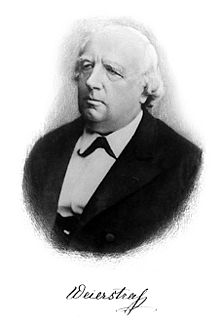Karl Weierstrass | |
|---|---|
| Karl Weierstraß | |
 | |
| Born | 31 October 1815 |
| Died | 19 February 1897 (aged 81) Berlin, Kingdom of Prussia, German Empire |
| Nationality | German |
| Alma mater | |
| Known for | |
| Awards |
|
| Scientific career | |
| Fields | Mathematics |
| Institutions | Gewerbeinstitut, Friedrich Wilhelm University |
| Academic advisors | Christoph Gudermann |
| Doctoral students | |
Karl Theodor Wilhelm Weierstrass (/ˈvaɪərˌstrɑːs, -ˌʃtrɑːs/;[1] German: Weierstraß [ˈvaɪɐʃtʁaːs];[2] 31 October 1815 – 19 February 1897) was a German mathematician often cited as the "father of modern analysis". Despite leaving university without a degree, he studied mathematics and trained as a school teacher, eventually teaching mathematics, physics, botany and gymnastics.[3] He later received an honorary doctorate and became professor of mathematics in Berlin.
Among many other contributions, Weierstrass formalized the definition of the continuity of a function and complex analysis, proved the intermediate value theorem and the Bolzano–Weierstrass theorem, and used the latter to study the properties of continuous functions on closed bounded intervals.
- ^ "Weierstrass". Random House Webster's Unabridged Dictionary.
- ^ Duden. Das Aussprachewörterbuch. 7. Auflage. Bibliographisches Institut, Berlin 2015, ISBN 978-3-411-04067-4
- ^ Weierstrass, Karl Theodor Wilhelm. (2018). In Helicon (Ed.), The Hutchinson unabridged encyclopedia with atlas and weather guide. [Online]. Abington: Helicon. Available from: http://libezproxy.open.ac.uk/login?url= Link Accessed 8 July 2018.